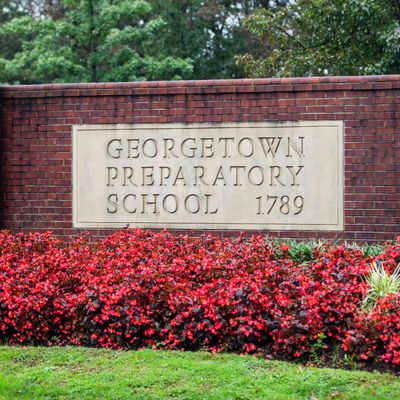
It gained some attention, even in the middle of a very crowded news cycle, when the prominent Jesuit magazine America rescinded its endorsement of Brett Kavanaugh’s Supreme Court confirmation after Christine Blasey Ford’s Senate testimony. Kavanaugh, after all, has constantly and proudly talked about his character and career being shaped by the Jesuit education he obtained at the super-elite Georgetown Preparatory School in the Washington suburbs. And he was at Georgetown Prep when the alleged sexual assault against Ford — along with the gang rapes that Julie Swetnick, herself an alleged victim, has reported in a sworn affadavit — were said to have occurred.
America endorsed Kavanaugh back in July because of the high likelihood (which ironically, he tried so very hard to deny or obscure in his first Judiciary Committee testimony) that he would help overturn Roe v. Wade, and eliminate any constitutional right to an abortion. Its second thoughts involved an issue that is all too familiar to contemporary Catholics:
[T]his nomination battle is no longer purely about predicting the likely outcome of Judge Kavanaugh’s vote on the court. It now involves the symbolic meaning of his nomination and confirmation in the #MeToo era. The hearings and the committee’s deliberations are now also a bellwether of the way the country treats women when their reports of harassment, assault and abuse threaten to derail the careers of powerful men.
Substitute “children” for “women” in that last sentence and you have an issue that has been of paramount concern to Catholics everywhere recently. And while America did not mention the parallels explicitly, the church’s child sex abuse crisis had to be in the background in discussing the situation. In an article about Kavanaugh’s staunchest supporters, Emma Green noted that prominent Catholic conservative Mary Rice Hasson is battling the obvious connections between abuse allegations:
For Catholics like Hasson, this summer was a whirlwind of sexual-abuse allegations: When Pope Francis was accused of obscuring the inappropriate conduct of a D.C. cardinal, Hasson organized a letter from prominent Catholic women calling for an investigation. Stephen White, her colleague… told me that “the exhausting slog” of news about Catholic Church abuse “has really weaned a lot of people off of the habit of viewing sexual-abuse allegations through a partisan lens.”
During Christine Blasey Ford’s searing testimony, the convergence of all the horrible strands of suppressed abuse became apparent in those handling calls to the National Sexual Assault Hotline, as this report from Maine indicates:
[Mealanie] Sachs said calls to the helpline in Maine have been growing for about a year, and she attributes the increase to the #MeToo movement in which women have reported sexual assaults by powerful men, such as movie producer Harvey Weinstein and former Fox News chairman and CEO Roger Ailes, or scandals over child sexual abuse by Catholic priests. Media coverage of those reports, as well as Ford’s allegations against Kavanaugh, tend to lead to more calls, she said.
And the Catholic Church is far from being the only institution that stands accused of covering up the criminal behavior of powerful men, as Green noted:
[W]omen who are sympathetic to the pro-life movement have watched what’s happening with dismay. Rachael Denhollander — who helped lead the group of women who spoke out against Larry Nassar, the Michigan State University doctor accused of sexually abusing hundreds of female athletes — told me in an interview last Thursday that she is seeing “a very typical, age-old response” to the allegations against Kavanaugh: “Institutional protectionism. That’s wanting to say that sexual assault is terrible, but it’s different in this case because she’s politically motivated, because she’s lying, because he would never do that.”
Beyond the issue of sexual abuse, the Kavanaugh case has also raised questions among Catholics about the culture of elite schools like Georgetown Prep, an all-male environment where even Kavanaugh admits excessive drinking went hand-in-hand with expectations of high academic, social and economic achievement. American Catholic Reporter columnist Michael Sean Winters touched this sore tooth the day after Ford-Kavanaugh hearing:
For Catholics, this whole episode raises a disturbing question about our church’s continued involvement in providing elite education to affluent children….
If even half the things alleged about the behavior of these Georgetown prep boys are true, then they brought a whole new meaning to the phrase “men for others.” Is anyone surprised that these elite schools would produce young men who conduct themselves towards women — or others — in such high-handed ways because they can? Because they know they are on the right trajectory? They attended elite high schools to prepare themselves for elite universities to prepare themselves for elite careers. Why shouldn’t a precocious 17-year-old boy think he can have his way with women when he is being told all day, every day that he can have his way with the world, that he is being groomed to be a master of the universe?….
I understand that the Society of Jesus has a long tradition of educating the children of the cultural elites. It made sense to do so in the 16th century…. The Society should think long and hard about how this mission of educating elites dovetails with the mission assigned to all Christians by our founder, to announce good news to the poor.
During the Kavanaugh hearings, Democrats have been wise to avoid the sort of interrogation of the judge over his religious views that marked Amy Comey Barrett’s confirmation hearings for the 7th Circuit Court of Appeals last year (in which Dianne Feinstein famously said of the Notre Dame law professor: “The dogma lives loudly within you, and that’s a concern.”). Thus Republicans have been unable to rally Catholics to his cause as a matter of communal solidarity. And if the investigation into Kavanaugh’s behavior at Georgetown Prep continues to create an association between elite Catholic education and casual, and even violent, misogyny, those who belong to a church with enough problems fighting abuse may turn a cold shoulder to him altogether.






























